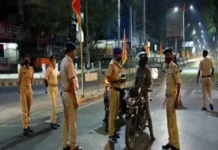Abandoned, beaten up and sometimes, left on the road to fend for themselves. Elderly in India lead a very different life than the ideal one we see in Hindi films. #KhabarLive decided to investigate the complex web of issues around elderly abuse. India is ageing, but do we care enough?
The buzz now is that India will soon be the ‘youngest’ country in the world. But 30 years from now, the pyramid will invert and there will be more older people.
“India is all set to become the youngest country in the world. By 2020, 64% of the population will be in the working age group. This demographic transition will give India an edge in terms of development.”
How many times have we heard this statement made in the last five years? Of how India is moving from strength to strength thanks to youthful population, who are working in the secondary and tertiary sectors; how being the youngest country is giving a push to the economy and infrastructure.
But how many people are talking of the 103 million elderly people – those aged above 60 – in our population and who is taking care of them?
Understanding this phenomenon
As per the 2011 census, the elderly make up 8.6% of the total population, and experts opine that this could go up to 20% by 2050. At this rate, India will soon overtake China in terms of the number of elderly in the country.
“This excitement about India being a young country is misplaced,” says Himanshu Rath, founder-chairman of Agewell Foundation, a not-for-profit organisation, which works towards the welfare of the elderly in India. “This population that is under the age of 35 now will be over 60 years of age in the next 30 years or so.”
Moreover, due to a variety of factors – government policies, societal and sociological reasons – the population is starting to decrease in India. So, experts say, in a few years from now, there are likely to be more older people in the population than younger people, leading to an imbalance.
“It becomes an inverted pyramid,” says Anupama Datta, Director, Policy Research and Development, Helpage India, a charity that works with the elderly. “There are more older people then, and not enough younger people to look after them.”
According to research, 65% of the total population of elder people in India right now are poor. Many of them spend a disproportionate amount on medical expenses, and many of them are so poor they don’t know where their next meal will come from. The number will increase in the next 30 years or so when there are more older people in the country.
Role of government
There was a recent case in Warangal, where an 83-year-old man killed his 78-year-old ailing wife and tried commit suicide himself. He was caring for her three months, and their children worked as daily wagers. The police said that he was struggling to care for her, which is what pushed him to take the step.
There are several factors at play here, say experts. One, her medication would have drained family resources; two, the man, who worked himself, could not provide for the family as he had to take care of his wife, thus affecting their purchasing power; and three, he was very old himself, the strain, both physical and mental, could have been too much.
Here, proper government policies in place, providing medication and care for the elderly, assumes prime significance.
“All the development we see in India today is all thanks to the generation before us. Everything we have achieved is because of them. They were young at some point of time and worked very hard to build this country. They may have worked as a construction labourer to build the cities we see today, or they have been a scientist who helped launch a rocket and put India on the space map,” says Himanshu. “They invested their lifetime to bring this country where it is today. So why can’t the government support them?”
As per data available, 41.6% of the elderly in India are still forced to work to survive from day to day.
“There are government policies, but they have not been implemented properly. Policies with regard to older people in India look very good on paper, but implementation is key here. The government does not take this very seriously, but that’s also because there aren’t enough voices on the ground demanding a policy, implemented properly, be put in place,” says Anupama.
In India, due to cultural factors, the thrust is on children to take care of their parents. This was compounded by the Parents Maintenance Act, 2007, which legally obligated children and heirs to take care of their parents through a monthly stipend. But with over 7% of the population unemployed, how can they provide for their aged, if not ailing, parents?
“The government, through this Act, has washed its hands off caring for the elderly and simply passed on the onus to the children alone,” says Himanshu.
A study done by Helpage India on these tribunals set up to implement this act concluded that not only were they poorly staffed and lacked basic tools for work, such as computers and the internet. Moreover, most petitioners were unhappy with how the judgements were implemented and demanded that a better mechanism be set up to ensure the final decision is implemented and defaulters are dealt with The Ministry of Health and Family welfare launched the National Programme for Healthcare of Elderly in 2010, which aims to provide free, specialized healthcare facilities exclusively for elderly people through the State-delivered healthcare mechanism.
However, experts on the field say almost nothing from this programme has been implemented.
“Health is a state subject. So states are demanding funds from the Centre to implement this, and even if they do receive the funds, implementation is very poor. Either these geriatric clinics don’t exist, or if they do, they are understaffed and lack basic tools to help the doctors working there,” says Anupama.
There are many interconnected factors here the government must consider — gender, income, nutrition, access to health centres and medication, spending powers, to name just a few. “Unless the government puts its mind to it, we’re not going to see much change,” she adds.
Economics of ageing
People are living for longer now. “Earlier, if someone lived until 65, you would think they’ve lived a long, happy life,” says Himanshu. “But now, it’s so common to hear of people living until 85 or 90 years of age. The economics have drastically changed now.”
For one, most people retire by the time they are 60 or 65, and the number of people working in private sector jobs has increased.
“So when a person retires, will their pension keep them going for the next 20 or 30 years? How long will their savings last, how long will their investments last?” asks Himanshu. “There’s inflation, day-to-day costs, medical bills to be paid. How can you account for everything?”
Many older people have to seriously think about re-skilling themselves at 60, and start a second career once they retire to sustain their lives.
While most government-driven skill development programmes target people between the ages of 18-40, it should also consider targeting people between the ages of 60-75 so as to ensure they remain employable.
Another factor here, is the age of your children. If you fall ill between 60 and 70, your children are likely between the ages 35-45 themselves, and are more capable of administering help. But if you fall sick at 80 or 90, your children themselves are in their sixties, and it becomes more difficult for them.
“Moreover, economically too, they are in a different space. They have to pay their loans, for their children’s weddings, etc. So, taking care of parents is lower down the order. Practically, they can’t support aged parents the way they could earlier,” says Himanshu.
Ageing, health and women
In a survey conducted by Helpage India, in 2014, half of the elderly population surveyed reported poor to very poor health. The major health problems, the survey found, included age-related problems, asthma and hypertension.
Gerontology, or the study of the aged population, is still in its nascent stages in the country. This means that unfortunately there aren’t enough doctors who can care specifically for the elderly.
“How can a doctor who treats 20-year-olds treat a 90-year-old? At 90, your body is different. Even a car that is 10 years old, requires a different mechanic these days. So how can the same doctor treat a 90-year-old with the same parameters and the same medication as a 20-year-old?” asks Himanshu.
The ‘Caring for our elders: Early response India Ageing Report 2017’ by the UN Population Fund noted that in 2011, among the elderly, for every 1,000 men there were 1,033 women. And this is projected to rise to 1,060 women to 1,000 men by 2026. Almost every state in India sees elderly women living longer than men.
According to the report, between 2000 and 2050, the number of women aged above 80 years of age would have grown by 700%, and they would predominantly be widowed and/or very highly dependent old women.
India does not boast of a sparkling record when it comes to women accessing health and medical services, and it only gets worse as women grow older. Traditionally, in India, widows are treated poorly. “They are condemned to live a voiceless and nameless existence,” says Himanshu. “It doesn’t matter what they worked as, how much they earned, how respected they are in their community, the life of a widow is a tough one in India.”
Sensitisation
Old age is something that is bound to affect all of us, and everyone comes across old people – our parents, grandparents – but what do we know about old age?
Experts believe that sensitisation is key here. “There need to be lessons in school, in the curriculum, so we take age more seriously. There needs to be sensitisation, there needs to be knowledge, else people won’t prepare for their old age,” says Himanshu.
And because sensitisation is low, experts opine that the government and the private sector, through CSR initiatives, aren’t doing more for the aged. There are start-ups and NGOs that are trying to care for the elderly, but once again, they are in their nascent stages.
This sensitisation should not just be for children, but also middle-aged people so they are physically and financially fit, and open to reskilling themselves.
It all boils down to how much the government wants to do, say experts. Says Anupama, “There is only so much NGOs, experts and charities can do. Any programme by them will help, at most, thousands of people. But if the government puts its mind to something, absolutely everyone can benefit. If a new law or policy, implemented properly, is enacted, the entire population stands to gain.” #KhabarLive
(Video Courtesy: TheQuint)






